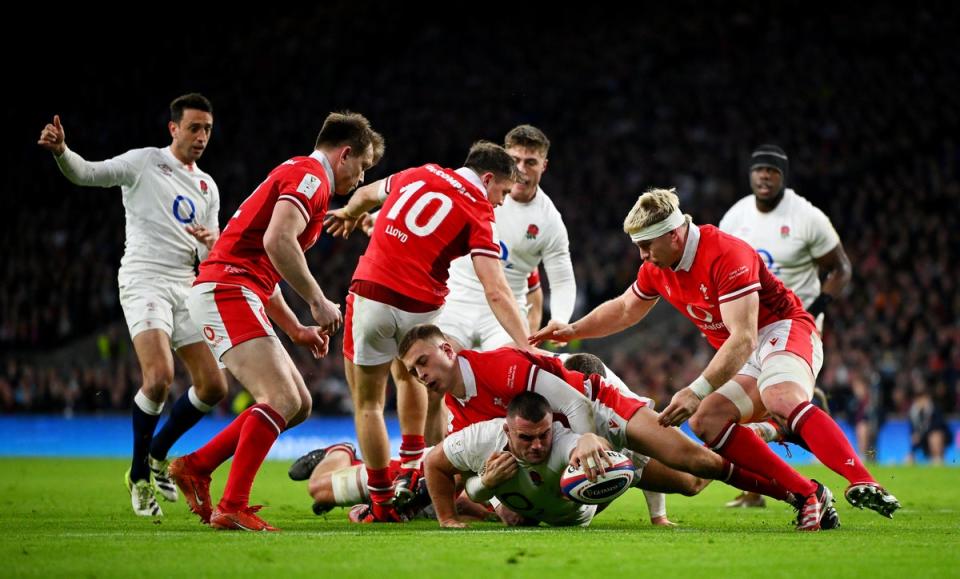England fight back to beat battling Wales in another narrow Six Nations triumph

Freddie Steward claimed the highest of high balls, then copped the nastiest of ungainly falls.
George Ford switched blind and booted the ballsiest of 50-22s, and two snapshot moments of ultimate quality floored a stubborn Wales at a worried Twickenham.
From the attacking lineout, Mason Grady knocked on deliberately and walked for a yellow card.
Ford slotted the facile penalty, and England claimed the lead for the first time in the match – with nine minutes to play.
England hung on to prevail 16-14, condemning Wales to a sixth-straight Six Nations loss at Twickenham.
Steve Borthwick’s men made it two wins from two, and just like their 27-24 victory over Italy in Rome last weekend, again England had to come from behind to prevail.
Ben Earl and Fraser Dingwall bagged tries for England, with Ford slotting two penalties.

Wales forced a penalty try and an impressively crafted score for Cardiff flanker Alex Mann.
England had to contend with two first-half yellow cards for Ollie Chessum and Ethan Roots, cut down to 13 men for a considerable stint.
The home side had to fend off a clutch of odd refereeing calls too, and a callow and inexperienced Wales acquitted themselves extremely well amid the maelstrom.
England tiptoed to victory again however, and despite another game littered with mistakes both cheap and system-based, the Red Rose men were just about value for the result.
Borthwick’s side will now roll on to Murrayfield to face Scotland, where a victory would elevate their new era yet again.
But new captain Jamie George’s fresh-looking side will have to raise their levels again to mount a serious challenge to Gregor Townsend’s men.
England started at some pace but spurned two great platforms and untold time in the Wales 22.
Steward might have scored had he not lost his footing in the 22 hurtling towards scrum-half Tomos Williams. His clean break from a kick return could so easily have proved a stunning score.
Then Ford opted to boot cross-field for Henry Slade, only for Rio Dyer to cope comfortably with the ploy.

So when Chessum was sin-binned after a video review for a high tackle – extremely harshly – England quickly went from dominance to disarray.
Chessum’s tackle on Keiron Assiratti was shoulder to head, but he was also trying to rip the ball, and the Wales prop was on his way down. That had penalty written all over it, but the officials deemed otherwise and that was that.
England were then quickly penalised at a scrum for not wheeling in effect, when Joe Marler got the nudge and Wales stood up to move the ball away.
This call from referee James Doleman wound England up, even though they kept their heads. Wales punted to the corner, and from the resulting lineout drive, Roots was sin-binned for collapsing the maul.
Wales were going to score, so Doleman awarded a penalty try. All fair enough, but a dagger in England’s hearts.
So now the hosts had to battle through almost 10 minutes with just 13 men. At what should have been their lowest ebb though, England scored immediately.
Maro Itoje flattened Ioan Lloyd as he attempted to switch off a ruck deep in his own 22. Nothing screamed novice fly-half more than the naive decision, especially when he knocked on in contact and gifted England the scrum.
Earl then broke off the set-piece at pace, and bulldozed through four tacklers to score a fine try.
As Ford lined up the conversion, there was to be more controversy however. Wales all raced off their line, as the nonplussed Ford watched them scuff the ball clear.
Ford argued he had not started his approach to the ball, but referee Doleman disagreed, and the conversion attempt went down as a miss.

This time England really were furious. George walked all the way back from his own half to confront the Kiwi official in Wales territory, but clearly to no avail.
Once he had dealt with the conversion issue, George haggled about the earlier scrum penalty. So he should, because England had been oddly and unfairly hamstrung, and twice.
Still, at 7-5 down England hoped they could start to reassert some dominance. Wales had other ideas however, and slowly but surely applied a squeeze of their own.
Wales powered through 25 debilitating phases, sapping England’s energy, before Alex Coles was able to dislodge a ball and England cleared.
A lineout on halfway after the longest defensive set of the match offered England much-needed respite. But Ford opted to send Slade crashing into midfield, when England could have booted deep for territory and a breather.
England knocked on, and Wales seized all the momentum. Tommy Reffell pulled off a smart turnover, and in a flash Wales had scored.
Gareth Thomas drew England’s blitz defence out with a smart tip pass, Reffell carried on and then sent Tomos Williams through the line.
The scrum-half then fired out to Mann, with the Cardiff flanker gleefully racing home for a fine score. Lloyd converted and Wales took a 14-5 lead into the interval.
England settled for a Ford penalty to open the second half, cutting the deficit to six points. Josh Adams’ knock-on from a speculative Alex Mitchell high ball then allowed England to set up camp in the Wales 22.
Mitchell and replacement Ellis Genge both ploughed close, before England finally fired wide. Elliott Daly rescued a loose pass, diving to hold and managing to ship on in one fluid motion.
Dingwall was left lurking out wide, and the Northampton centre applied the finish. Ford could not add the touchline conversion, leaving England still trailing 14-13 just past the hour.
The impact of two wins from two matches after another few months of flux cannot be underestimated
As the game started to break up however, England finally put some control on proceedings. Steward rose masterfully to claim a stunning high ball, copping a nasty fall for his troubles.
Ford then matched the skill levels by switching sides and pinging a peerless 50-22 punt to the corner.
Grady was then sin-binned for that deliberate knock-on as England hunted a third try, and the Red Rose men settled for a second Ford penalty instead.
Finally, England had the lead for the first time in the match, with just nine minutes to play. Crucially too, Wales had to play the rest of the match with 14 men thanks to Grady’s yellow card.
Still England could not shut the game down though, with Wales driving into the high double figures in phases again.
But when a last-gasp chip of the line emerged, Steward again swept through, collected and booted deep into the Wales 22.
That was just about that, England were just about home, and the impact of two wins from two matches after another few months of flux cannot be underestimated.

